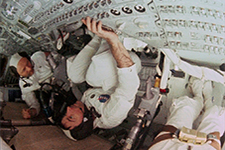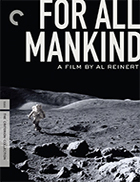For All Mankind (4K UHD)
|  Culled from thousands of hours of footage shot by NASA astronauts, almost all of which had never been seen before, For All Mankind returns the magic and wonderment to space travel, which has become all but mundane in the popular imaginary. By editing together bits and pieces from the nine Apollo missions that were launched between 1968 and 1972 (as well as a few shots from later Gemini missions), director Al Reinert has fabricated a seamless trip from the earth to the moon and back, a genuinely magisterial accomplishment that is presented as something both abstractly poetic and remarkably technical. Narrated with grace and heartfelt emotion by more than a dozen of the men who made the trip, the documentary is both exceedingly personal and decidedly epic, especially in the jaw-dropping footage of lift-off, which turns the fiery engines into a lyrical vision of raw, harnessed power. In many ways, For All Mankind is the essence of a pure documentary in the way it presents a unique experience with as little overt and attention-grabbing manipulation as possible. All of the footage (with the exception of one fabricated shot of the moon seen through the portal of a rocket about to launch) was taken from the NASA film archives, making For All Mankind an assembly of found footage, albeit found footage of the highest order (as Reinert put it, space is the biggest location in cinema history). The images in the spacecraft and on the moon were shot by astronauts using 16mm data-acquisition cameras, and they provide a level of detail and clarity that is often missing from the clips we have seen on television over and over again (Reinert insisted on going back to the original camera magazines that NASA held in cold storage to ensure the best possible quality for 35mm blowup). Various shots of the ground personnel, mostly chain-smoking, crew-cut men in bad ties, remind us that a trip to the moon is not just the realization of an ancient impulse, but also a technical triumph that represents a peak of human accomplishment that, despite its now familiar nature, is still outside most of our reaches. Footage of late-1960s and early-’70s command consoles and video monitors and large headsets have a certain archaic quality to them, yet their sheer girth and ingenuity still demand an impressed response. There are also astounding shots from inside the spacecraft that were captured automatically, and the fact that they are among the most beautiful in the film is ironic given that they were created for the purely practical purpose of ensuring that the engineers had a visual record of what happened in case anything went wrong. In this sense, For All Mankind is one of the great works of modern art in that it transforms the practical and the mechanical into something sensual and arresting. Reinert avoids manipulating his found footage as much as possible. When there is extradiegetic music by ambient-synth pioneer Brian Eno laid over the images, it is subtly atmospheric in underscoring the mesmerizing nature of leaving earth’s orbit and entering a completely alien world, an experience that can be claimed by only a handful of human beings in the entire history of humankind. Mostly, though, the soundtrack is composed of a seamless interweaving of sounds recorded during the actual missions (the astronauts breathing, ground control going through various checklists, the often humorously casual give-and-take between those on earth and those in space) and the reminiscences of the two-dozen astronauts who have traveled to the moon and back. With the exception of a few opening title cards, there is no text on the screen during the film, not even names to identify the various astronauts and ground personnel. On the one hand, this denies us direct knowledge of who we are seeing at any given point (unless you can identify famous astronauts on sight or by the sound of their voices), but it also functions to shift us away from an informative focus on who’s who and instead concentrate our attention on both the collective nature of the accomplishment and the experience of space travel itself. And what an experience it is. While there were films about space travel before Reinert’s film and many, many more since (including both documentaries like HBO’s From the Earth to the Moon and fictionalized docudramas like Ron Howard’s Apollo 13, both of which Reinert helped write), none have quite managed to capture the pure essence of what the experience must have been like. For Reinert, who began his career as a magazine journalist before stumbling into the NASA archives and becoming captivated by all the footage of space travel that no one had ever seen, the film is first and foremost about a journey, and it encapsulates with great power the wonderment of something that too many of us now take for granted.
Copyright © 2022 James Kendrick Thoughts? E-mail James Kendrick All images copyright © The Criterion Collection | ||||||||||||||||||||||||||||
Overall Rating: 


 (4)
(4)


